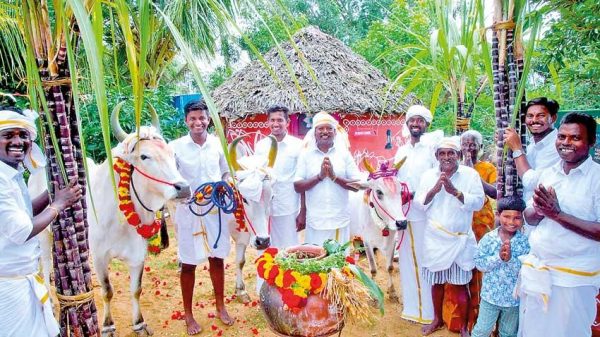Thai Pongal, a tribute to Sun God By Dr Subashini Pthmanathan

Source:dailymirror.lk
 Thai Pongal is regarded as one of the most important festivals among the Tamil Hindu Festivals. It is widely celebrated in India and all over the world by the Hindus. The Thai Pongal festival takes place on the first day of the Tamil month of Thai.
Thai Pongal is regarded as one of the most important festivals among the Tamil Hindu Festivals. It is widely celebrated in India and all over the world by the Hindus. The Thai Pongal festival takes place on the first day of the Tamil month of Thai.
Generally, the people celebrate the day as thanks giving day for the Sun God. The Son God provides energy, strength, and light for the paddy cultivation. Rice is considered the staple food in many parts of the world including Sri Lanka. Even Thai Pongal is said to be a Tamil Hindu festival, it is considered as a farmers’ Thanksgiving Day known as Ullavar Thirunal (Farmers Festival). Ullavar means farmers and Thirunal means an auspicious day.
However, Thai Pongal day is known by different names in the Indian States. Some of them are Makar Sankranthi, Uttarayan, Maghi, Sankranthi or Pough.
Many Indian States refer to this particular day as Makar Sankranthi or Makara Sankranthi as it reveals that in the Zodiac calendar the Sun God enters into Makar Rasi (Capricorn) on this day.
Hindus celebrate the day as Thanksgiving Day for the Sun God. The Son God provides energy, strength, and light for the paddy cultivation. Rice is considered the staple food in many parts of the world including Sri Lanka. Even Thai Pongal is said to be a Tamil Hindu festival, it is considered as a farmers’ Thanksgiving Day known as Ullavar Thirunal
According to the Zodiac calendar, there are 12 signs. They are generally called 12 Rasis. Normally the event takes place on the 14th of January every year, except in leap years. A year consists of 365.24 days. In a leap year, the Makar Sankranti or Thai Pongal day festival takes place on the 15th of January of that year.
In the different States of India, the Makar Sankranthi festival is celebrated with different regional variations and identification. In Karnataka, it is referred to as Makara Sankramana or Makara Sankranthi.
In Uttarakhand, Makar Sankranthi is also called Ghughuti. In Odisha the Makar Sankranti is known as Makara Mela or Makara Chaula. Similarly in Kerala, the festival is known as Makara Villaku or Makara Jothi. In Bihar, it is called the Til Sankirant. In West Bengal and East Bengal (present Bangladesh), the festival is called Poush Sankranti. Similarly in Goa and Maharastra, the festival is often referred to as Sankranthi. In Punjab, Haryana and Himachal Pradesh, the festival is known as Maghi. In Assam, the festival is known by the name Margh Bihu or Bhougali Bigu. In Gujarat, the same festival is called Uttarayan. In Telangana state, Andra Pradesh and Madya Pradesh it is known as Makar Sankranth, Sankranthi or Uttarayana.
The festival is known as Thai Pongal in Tamil Nadu and Sri Lanka and among Tamils. It takes place on the first day of the Hindu Tamil calendar Thai. Even though it is generally considered a Tamil Hindu festival, especially in Sri Lanka, it is considered as Ullavar Thirunal. The Thai month in the Tamil calendar comes after Markali month associated with Hindu events.
Markali month is normally considered a dull and rainy month. Markali is followed by the bright and pleasant month of Thai. Hindus make two varieties of Pongal rice, one is the non-sweet Pongal prepared with cow’s milk and coconut milk and the other variety is the sweet Pongal rice made out of fresh jaggery, coconut milk, cow’s milk, ghee, honey and numerous other ingredients for the flavour and is offered to Sun God as a thanksgiving offering.
The farmers prepare the Pongal out of their newly harvested rice crop. Traditionally, the people use new clay pots for cooking the Pongal. They cook the Pongal outside the houses to make the cooking vessel to face the Lord Son God directly. They decorate the neck of the pot with ginger, turmeric leaves and fresh mango leaves. It is the auspicious symbol for houses, progress and prosperity for the year.
The following day of the Pongal is known as Mattu Pongal or Patti Pongal. That is the Pongal for cattle. The farmers or the Hindus bathe their cattle and decorate them from the day of ploughing the land till the end of the harvest.
It is a way of expressing their gratitude to cattle which helped them in numerous ways for the paddy cultivation. Mattu Pongal is followed by Kanum Pongal.
It is almost a social event for people to visit their friends and relations. They greet and exchange presents with one another on
this occasion.







